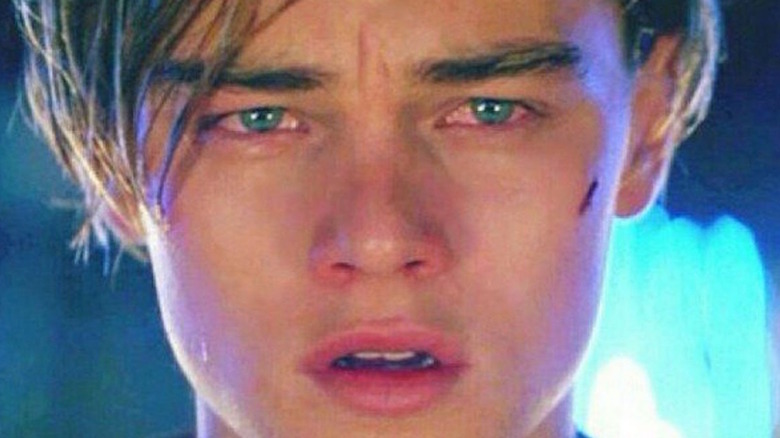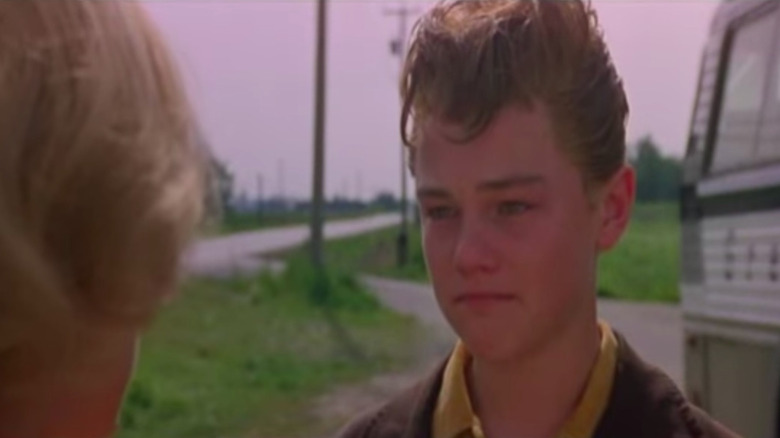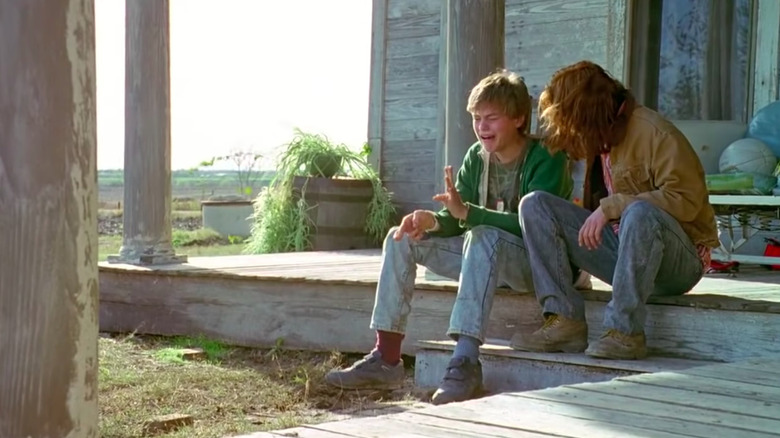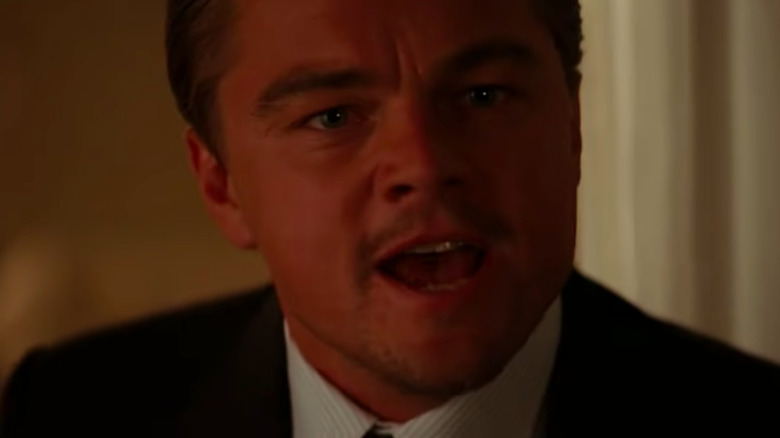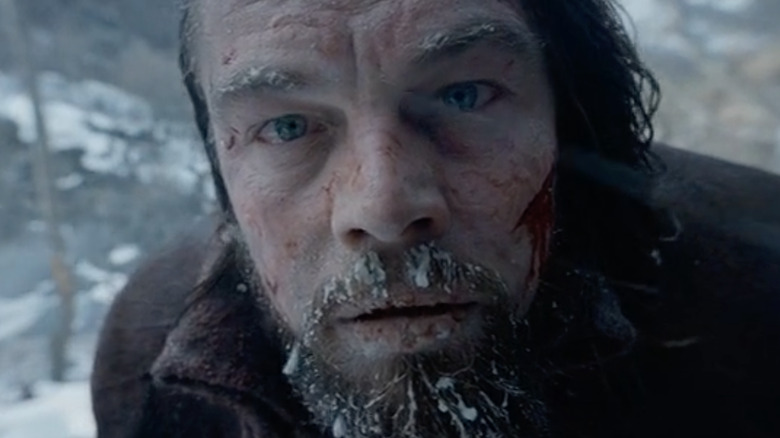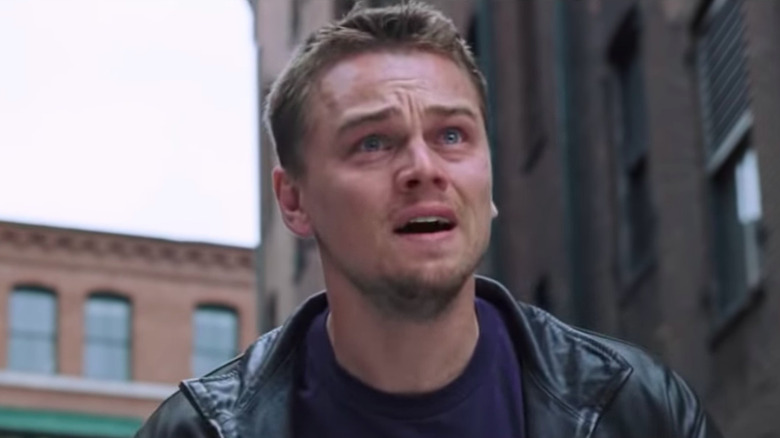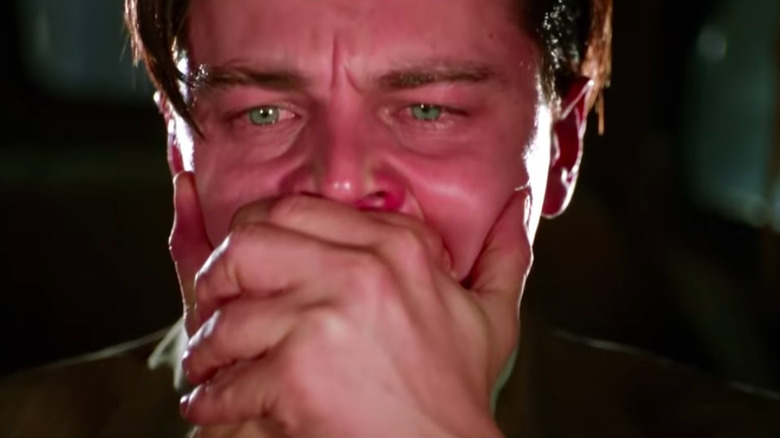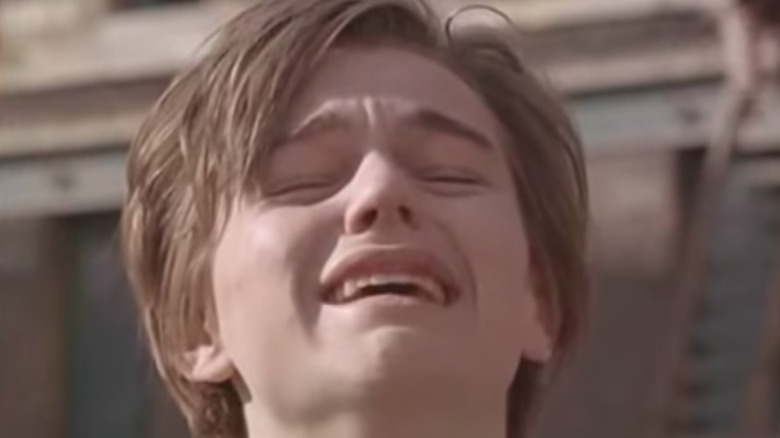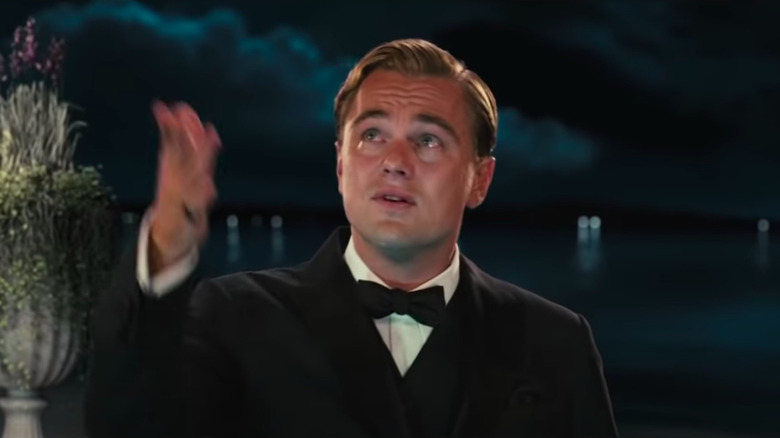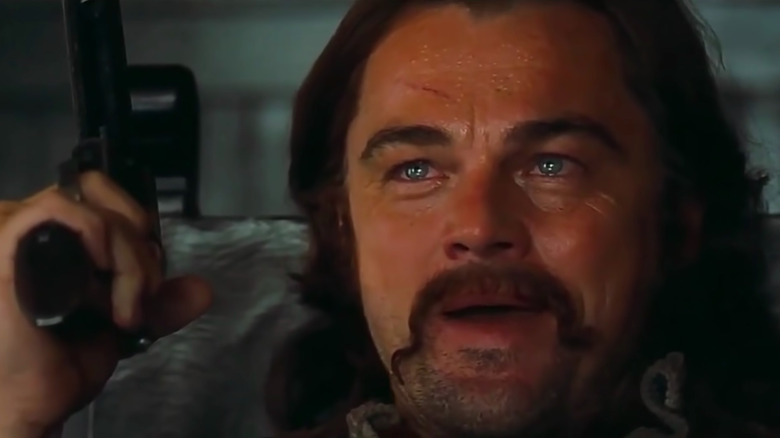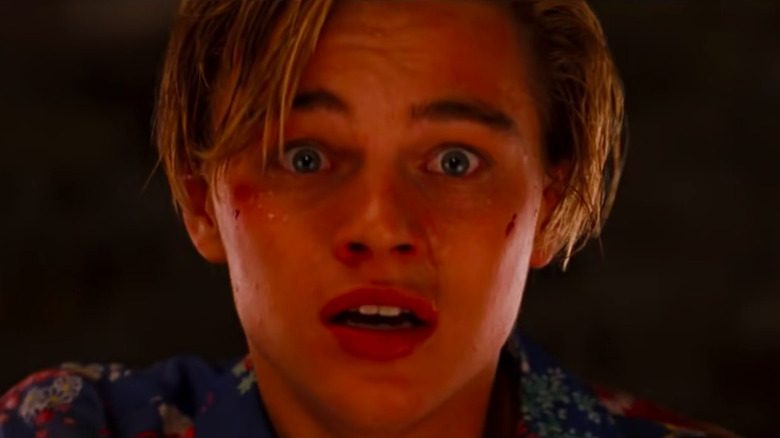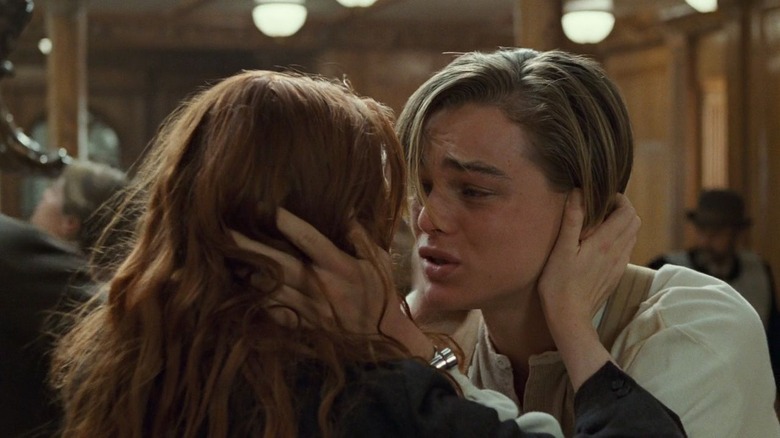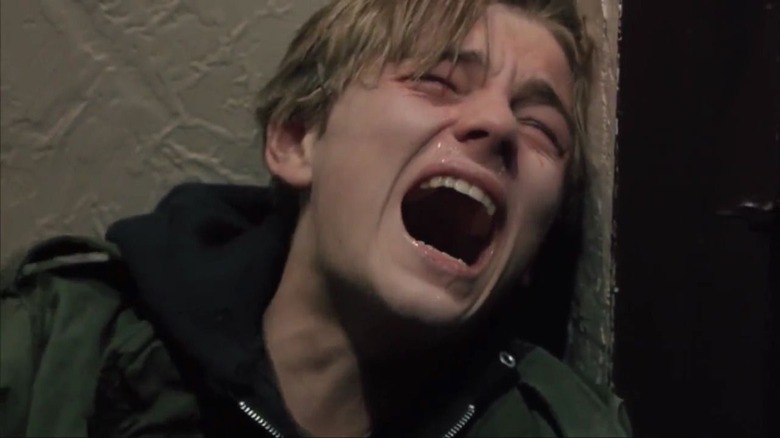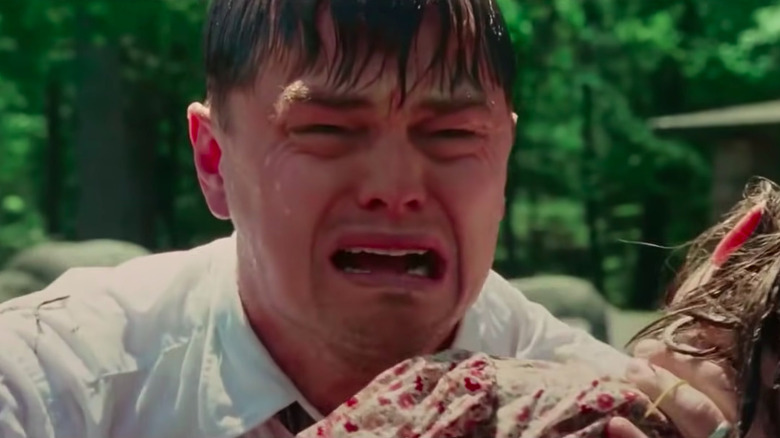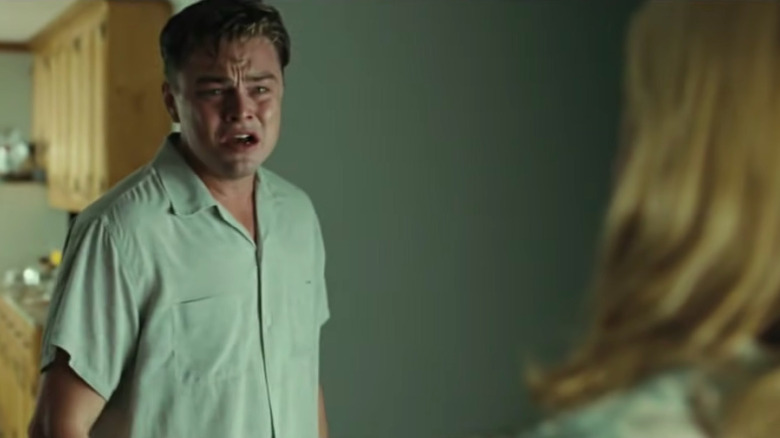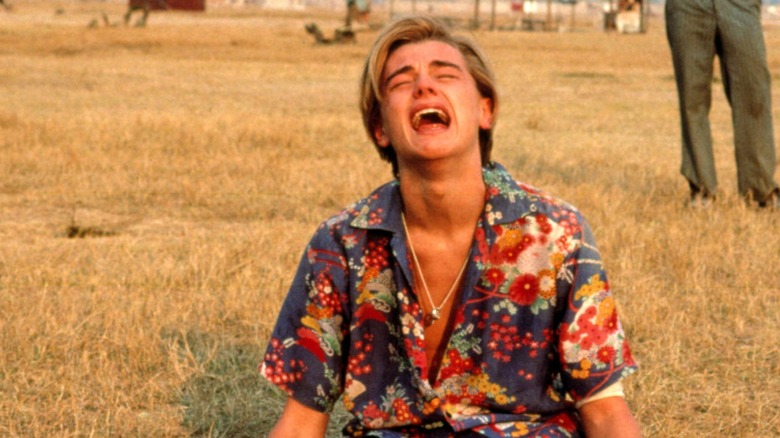Every Time Leonardo DiCaprio Cried On Camera, Ranked
Like him or not, Leonardo DiCaprio is probably the American actor most known for crying, screaming, yelling, or otherwise portraying emotional outbursts. Gifs and screenshots of Leo weeping abound across the internet. Surprisingly, Leo only has one Oscar to his name –- for "The Revenant," in which he barely cries but screams often –- despite being nominated six times. Though his Oscar win for "The Revenant" wasn't universally celebrated, DiCaprio's impressive body of work makes it clear that his acting chops are worthy of acclaim.
DiCaprio started acting at a young age in commercials and television shows of the 1980s. His first starring role was 1993's "This Boy's Life," which co-starred Robert De Niro, followed later that year by "What's Eating Gilbert Grape," for which he was nominated for Best Supporting Actor. In just a few short years, he rose to meteoric fame with 1996's "Romeo + Juliet" and, the film he is still probably most known for, 1997's "Titanic." Both films are doomed romances, beloved just as much for their tragic elements as they are for Leo's winsome performances.
From child prodigy to '90s heartthrob to seasoned actor and activist, DiCaprio's career has spanned genres and decades. But through all of this, one thing has remained the same: the guy's really good at crying. Here's our list of all the times DiCaprio has cried on camera, ranked by narrative significance and how hard they pull on our heartstrings.
15. Tobias leaves his abusive father
"This Boy's Life" was DiCaprio's first film, and it was released when he was a fresh-faced 19-year-old (though he looks quite a bit younger). The film is based on a memoir written by Tobias Wolff, whom DiCaprio plays in the film. The movie follows Tobias as he contends with his abusive stepfather, Dwight, played by Robert De Niro, and tries to improve his grades so he can leave town and attend boarding school.
Unsurprisingly, this coming-of-age film ends with Tobias growing up and leaving his stepfather for good. In the final scene of the movie, Tobias' mother, Caroline, defends Tobias from Dwight. Tobias tells Dwight they can leave right now if they want. Caroline finally listens to Tobias this time, and they leave right then and there. Caroline gets on a bus to the city, and Tobias heads off to boarding school.
It's a touching scene, and Leo's performance is wonderfully heartfelt and believable, especially knowing what he's gone through previously in the film. He acts like a boy trying to grow into a man right before our very eyes, and despite his tearful goodbye to his mother, we know they're both going to be all right.
14. Arnie kills a grasshopper
"What's Eating Gilbert Grape" also came out in 1993 and earned Leonardo DiCaprio his first Oscar nomination. The film follows Gilbert Grape (Johnny Depp), a young man tasked with taking care of his unwell mother (Darlene Cates) and his intellectually disabled brother Arnie, played by DiCaprio. The film was received positive reviews, and DiCaprio specifically was praised for his sensitive portrayal of Arnie.
Though there are several scenes in the film where Arnie cries or appears near tears, (such as when Gilbert hits Arnie in the bathroom or when his sister tackles him), one scene stands out for its heartfelt simplicity. In the scene, Arnie is playing with a grasshopper and slams it with the mailbox, accidentally killing it. Arnie is upset with what he's done and Gilbert finds him crying on the porch of the house. It's a simple scene that DiCaprio plays perfectly, and Arnie's sobs sound so real it's hard not to feel for both him and the grasshopper.
13. Cobb faces Mal's death
"Inception" is certainly one of Leonardo DiCaprio's most popular films (though to be fair, it's difficult to find many films of his that weren't successful), having made $826 million worldwide at the box office when it came out in 2010. DiCaprio's role in the film is central. In fact, director Christopher Nolan had DiCaprio in mind for the film before he cast anyone else.
"Inception" is fairly complex. Audiences still aren't sure what to make of the ending. DiCaprio himself says of it: "What happened? I have no idea." The simplest plot summary we can offer is that the movie follows DiCaprio's Cobb, who can enter people's dreams.
One of the most devastating plotlines in the film involves Cobb's wife, Mal (Marion Cotillard). Partway through the film, Cobb reveals that he and Mal once spent the equivalent of 50 years in a dream world. When Mal finally awoke from the dream, she believed she was still dreaming and committed suicide in an attempt to wake herself up. This tragedy has defined Cobb's life, and the desperation is evident on his face as he sees what Mal is about to do.
The main reason this scene isn't higher up on the list is that it's so short –- it cuts off just after Mal jumps, so we don't get to see the full devastation Cobb experienced. Nonetheless, the trauma of this event influences Cobb's behavior throughout the film and leads to that divisive ending.
12. Hugh Glass lives to see another day
"The Revenant" is set in 1823 and follows frontiersman Hugh Glass (DiCaprio) after he suffers both a brutal bear attack and the loss of his son (Forrest Goodluck) at the hands of a fellow hunter (Tom Hardy). Most of the film follows Glass trying to heal from his injuries and survive in the wilderness while also avenging his son.
"The Revenant" has been noted for its hard-to-watch, realistic brutality. DiCaprio was so committed to the role that he did many of the things his character did, including eating raw bison. Despite the intensity of the film, DiCaprio doesn't cry much in the movie; most of his exclamations are screams or grunts.
The one scene where he does cry (or at least comes close to it) occurs at the very end of the film. Still alive despite his travails, Glass is hiking through the snow when he sees a vision of his dead wife, which convinces him to go on. The film's final shot is Glass, with tears in his eyes, shivering in the cold and looking straight at the camera. Though not the most dramatic moment of the film, DiCaprio's understated performance in this scene is a welcome relief after the intensity of the rest of the movie.
11. Captain Queenan's death
"The Departed" (2006) was directed by one of Leonardo DiCaprio's most frequent collaborators, Martin Scorsese, with whom he has made a total of five films. DiCaprio plays Billy Costigan, a state trooper who goes undercover to infiltrate the gang of mobster Frank Costello (Jack Nicholson). At the same time, Costello has planted one of his own, Colin Sullivan (Matt Damon), within the Massachusetts State Police. Known as much for its Boston accents as for its surprising and thrilling action, "The Departed" remains one of DiCaprio's most exciting roles.
In one particularly stressful scene, police captain Queenan (Martin Sheen) dies after being thrown off a building. Costigan only has moments to react to Queenan's death before he's found out. Costigan goes from shocked, to upset, to scared, to angry all in a matter of seconds, and then still manages to regain his composure moments later when his crew catches up with him. This DiCaprio crying scene is short, but undeniably effective.
10. Howard Hughes has a panic attack
Another film with Martin Scorsese was "The Aviator," which came out in 2005. In it, DiCaprio plays Howard Hughes, the famed billionaire, pilot, and filmmaker. The film portrays Hughes as a highly motivated but troubled individual. Though successful in business, Hughes is also plagued by mental health issues such as his worsening OCD. The film follows his many highs and lows, which include his relationships with stars such as Katherine Hepburn (Cate Blanchett) and Ava Gardner (Kate Beckinsale). Though it may not be Leo's most popular film, it's actually the actor's personal favorite in his filmography.
In one scene that illustrates Hughes' worsening mental state, he has a panic attack after he believes one of his janitors is staring at him. After leaving the building, Hughes goes to sit in his car, where he fully breaks down. Alone, Hughes spells the word "quarantine," something his mother taught him during a cholera outbreak in his youth. Here, DiCaprio masterfully embodies someone who is struggling within their mind and fighting desperately to keep it together.
9. Arthur Rimbaud faces being alone
Though not one of his best-known films by any stretch of the imagination, "Total Eclipse" contains a very gif-able Leo moment. The 1995 film follows a passionate, volatile love affair between two real-life poets, Arthur Rimbaud (DiCaprio) and Paul Verlaine (David Thewlis). The teenage Rimbaud is much younger than Verlaine and much less concerned with respectability. Needless to say, their relationship does not end well. One night, Verlaine drunkenly shoots Rimbaud and is sentenced to prison. Upon Verlaine's release, they try and fail to get together once more, and Verlaine decides to travel the world.
In the most frequently giffed scene of the film, Verlaine gets on a boat and leaves, never to see Rimbaud again. Terrified at the prospect of being alone, Rimbaud screams at him to stay. "How am I supposed to live?" he yells. Though he begins the scene laughing, once he realizes Verlaine is actually leaving he quickly changes his tune. This scene is a classic DiCaprio moment and his youthful appearance only further emphasizes his despair. DiCaprio's voice gives that characteristic crack as he's screaming at Verlaine to stay, and the anguish on his young face is hard to forget.
8. Gatsby's stuck in the past
The second of his collaborations with director Baz Luhrmann, "The Great Gatsby" is a decidedly divisive film. You either love it for its over-the-top glamour and anachronistic soundtrack, or you hate it. Whatever your opinion of the film, it's a classic DiCaprio role that utilizes his many charms. Based on the F. Scott Fitzgerald book of the same name, the film follows Nick Carraway (Tobey Maguire) and his relationship with his rich neighbor Jay Gatsby, who is obsessed with reuniting with his long-lost love, Daisy (Carey Mulligan).
Determined to get back together with Daisy, Gatsby throws a huge party to impress her. After Nick tells him, "you can't repeat the past," Gatsy replies, "why of course you can." With tears in his eyes, Gatsby wonders why Daisy doesn't realize he's done all of this for her –- his wealth, his house, his party –- and why she won't leave her husband Tom. DiCaprio's performance is that of a man stuck in the past. The scene is doubly sad because both Gatsby and the audience know this relationship is doomed. The inevitable tragedy of this character is exactly what DiCaprio excels at. It's a fairly understated performance, as far as DiCaprio goes.
7. Rick Dalton redeems himself
In Quentin Tarantino's 10th movie, "Once Upon a Time... in Hollywood" Leonardo DiCaprio plays Rick Dalton, a washed-up actor known for Westerns who is struggling to revive his career in 1969 Hollywood. The film also follows his stuntman, Cliff Booth (Brad Pitt), plus the Manson Family and their murder target, the actress Sharon Tate (Margot Robbie). After being cast as the villain in a new Western series, Dalton struggles to remember his lines and has a breakdown in his trailer, resulting in Leo's first crying scene in the film.
The second, however, is the most memorable. After acting in a scene with a young actress, Dalton finally gets a good take. After the director congratulates him, the 8-year-old actress in the scene leans over and whispers in his ear, "that was the best acting I've ever seen in my whole life." The camera zooms in on Dalton's face as he reacts to her compliment. DiCaprio's performance here knocks it out of the park. As the camera gets closer and closer to his face, he tears up and clenches his fist, completely overcome with emotion at finally getting his long-sought redemption. "Rick f****** Dalton," he exclaims, loading his prop gun in elation.
6. Romeo and Juliet meet their fates
If we're speaking of doomed romance, "Romeo + Juliet" must be part of the conversation. Baz Luhrmann's 1996 film is a modern retelling of Shakespeare's play, set in the 1990s in the American city of Verona Beach rather than 14th century Italy. While the plot and dialogue in the film remain faithful to the original Shakespeare, the setting and style of the movie are fresh, making it a fan-favorite among DiCaprio's filmography.
Unsurprisingly, Leo's performance in the movie is a delight. DiCaprio has several highly emotional scenes in the film, one of which is the final death scene between the young lovers. As we all know, Romeo and Juliet are star-crossed, as this last scene shows. After finding Juliet at her funeral and presuming her dead (she's still alive, just deeply asleep), Romeo takes poison to join her in death. Moments later, Juliet wakes up from her self-induced coma to find Romeo taking his last breaths. The sorrow in Romeo's eyes when he realizes what he's done is enough to unnerve even the most stoic viewer. And to think, it's not even the best crying scene in the film.
5. Jack and Rose are reunited
"Titanic" is Leonardo DiCaprio's most beloved film. At the time of its release, it was the highest-grossing film of all time, making more than $2 billion at the box office. (It's currently ranked the third-highest-grossing film, having been edged out by another James Cameron film, "Avatar," as well as "Avengers: Endgame.") As we all know, the film takes place on the ill-fated Titanic ship and follows Jack, a poor artist who won his tickets in a game of poker, and Rose, a rich, depressed young woman engaged to be married to a man she despises.
The story isn't exactly a happy one for the lovebirds, though Rose does maintain that Jack saved her "in every way that a person can be saved." Jack, of course, could not be saved. In one of their last scenes together, Rose has secured a place on a lifeboat, but as she's being lowered down she looks up at Jack's face and decides she can't do it. Instead, she jumps off the lifeboat and climbs back onto the ship. Running to meet her, Jack hoarsely yells, "You're so stupid, Rose!" despite being overjoyed to see her again.
The scene is a heartbreaking mix of elation and despair, and DiCaprio plays it perfectly. When he finally finds Rose and hugs her, his voice cracks in that familiar Leo way.
4. Jim comes home
1995's "The Basketball Diaries" isn't Leonardo DiCaprio's most well-regarded film. A 2021 survey found that some fans see it as his worst. The movie follows the autobiographical story of Jim Carroll, a high school basketball star who copes with pressure from his coach and mother by acquiring a heroin habit. Many critics agreed that the story of teenage drug addicts was overwrought and the characters one-dimensional. The LA Times called the movie "a reverential wallow in the gutter of self-absorption."
Despite all of this, DiCaprio's performance is still a stunning example of his artistic talent. In one particularly gut-wrenching scene, Jim comes back home after he's been living on the streets and begs his mother for money. After she shuts the door on him, he sits in the hallway and sobs uncontrollably. Though we've seen how far Jim has fallen at this point, this scene (and DiCaprio's performance) emphasize just how young and lost he is. DiCaprio yells and sobs, screaming for his mother, telling her, "I'll be a good boy."
DiCaprio's performance here is utterly devastating. His tears and screams feel so real, so guttural, that it's clear DiCaprio has the unique ability to elevate even a weak script like this.
3. Teddy loses everything
Though DiCaprio's filmography is full of tearjerkers, "Shutter Island" is one of the most upsetting films he's been in. Directed by Martin Scorsese, the film follows U.S. Marshal Teddy Daniels (DiCaprio) and his new partner Chuck (Mark Ruffalo) as they travel to a remote asylum where a patient has improbably escaped. Things are not what they seem on the island and Teddy must confront his past to reveal the truth.
In one of the film's most devastating scenes, we learn what happened in Teddy's past and why he's been trying to repress his memories for so long. After coming home from work one day, Teddy finds his wife (Michelle Williams) soaking wet outside the house. After asking where the kids are, Teddy sees one of his kids floating in the lake and comes to a devastating realization. After finding his daughter in the water, he lets out a frantic sob, only to have his pain intensified when he realizes his two other children have drowned as well.
This scene is one of the most shocking scenes Leo has ever filmed, and he pulls it off just as we expect him to. Of course, he is unable to cope with this loss, which leads to the plot of the film. DiCaprio conveys this devastation with heavy sobs and screams that are difficult to ignore. After killing his wife, he sits over his family's bodies and cries, and the way he seems to choke on his tears is thoroughly affecting.
2. Frank and April have it out
"Revolutionary Road," the 2008 film starring Leonardo DiCaprio and Kate Winslet, is not for the faint of heart. The film centers on a married couple, Frank and April, who struggle their way through American suburban life in the 1950s. Both Frank and April are unhappy with the tedium of their lives. Frank is bored by his dreary job, and April struggles to accept the failure of her acting career. They have kids and move to the suburbs, but neither is happy and their relationship quickly deteriorates.
In one agonizing scene, their unhappiness and anger erupt and they have an all-out fight. After April says she doesn't love Frank, and, in fact, hates him, Frank explodes with anger. April asks Frank if he's going to hit her. He responds that she's not even worth the effort it would take, that she's "an empty, empty hollow shell of a woman," and that he wishes she would have gotten an abortion. It's at this moment when the tears start to come, as Frank can't contain his emotions any longer and the pain and anger become viscerally apparent on his face.
It's an incredibly heavy scene, and DiCaprio and Winslet both play it perfectly. While Frank starts out the scene trying to reason with April and deescalate the situation, once he blows up, it becomes impossible for either of them to go back. With a red face and his characteristic cracking voice, DiCaprio leaves it all on the table in this scene.
1. Romeo defies the stars
Obviously, the original source material of "Romeo + Juliet" is a very emotional piece of work, as are all doomed romances. One of the most heartbreaking scenes in the film is the aforementioned end. However, though it's a beautifully acted scene, it's not Leo's best tearful moment in the film.
That comes earlier, when Romeo learns about Juliet's supposed death. Romeo's friend Balthasar comes to see him in the trailer park where he's living and informs him he's just witnessed Juliet's funeral. A distraught Romeo falls to his knees, delivering one of the most memorable lines in the play: "I defy you stars," he screams up at the heavens, willing what he has heard to not be true.
His voice cracks and becomes hoarse, his face is wet with tears, and his chest heaves with sobs. Overcome with grief, Romeo can hardly breathe and chokes on his tears as he screams Juliet's name into the sky. DiCaprio is at his very best here, and it's impossible to imagine anyone other than him portraying Romeo's adolescent anguish.
